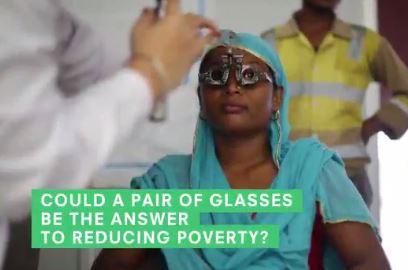HUGE GLOBAL PRODUCTIVITY BOOST IN SIGHT 
24 July 2018
A Queen's researcher has found for the first time how a simple pair of glasses can improve workers’ output and reduce poverty to achieve a huge global productivity boost in sight.
The research trial observed groups of Indian tea pickers and showed that the provision of glasses improved their productivity by 21.7 per cent – and for those aged over 50 the increase was 31.6 per cent. This represents the largest ever recorded productivity increase from any health intervention.
If the improvement was replicated across India’s crop industry it would mean an extra $20 billion in growth from productivity gains alone.
With 2.5 billion people worldwide suffering from poor vision and no access to glasses, the research demonstrates the crucial role of spectacles in achieving the Sustainable Development Goals.
The findings – in a study called PROSPER [PROductivity Study of Presbyopia Elimination in Rural-dwellers] published in the Lancet Global Health today – will intensify the pressure on companies all over the world to ensure that their workers have access to glasses, which can cost as little as $1.50 to produce, and other eye care treatments.

It will also add to the growing clamour for large companies who operate in poorer countries to provide free work-based sight tests, meaning the findings could have a game-changing impact on the way companies prepare their staff for work.
The research was sponsored by Clearly, a global campaign to bring clear vision to the 2.5 billion people worldwide denied it as quickly as possible. It was carried out in collaboration with VisionSpring, a social enterprise dedicated to providing affordable glasses across the world, and Orbis, a global organisation fighting avoidable blindness.
Professor Nathan Congdon the study’s principal investigator and Chair of Global Eye Health at Queen's who is also Director of Research at Orbis International, said: “We thought it was crucial to demonstrate that performance even of tasks which may not seem obviously visual can be boosted so impressively by glasses.
"Nearly 90% of workers were still wearing their glasses by the end of the study and virtually all were willing to pay to replace them if needed; people knew they were benefitting from better vision."
PROSPER is the first ever randomised controlled trial to explore the link between clear vision and productivity, representing a significant step forward in our understanding of the role of clear vision in accelerating the Sustainable Development Goals.
The trial, which involved 750 mainly female workers on plantations in Assam, showed that the daily weight of tea picked by those given glasses increased by over 5 kilos, which translated directly into increased income for the tea-pickers and their families.
James Chen, founder of Clearly, said today: "Seven hundred years after glasses were first invented we now have conclusive proof of the link between clear vision and productivity.
“Poor vision is the scandal the world forgot and affects a third of the world’s population. Solving this issue will accelerate progress against the UN’s goals on health, quality education, decent work, gender equality and poverty elimination."
A spokesperson from Amalgamated Plantations Private Ltd, owners of the tea garden where the trial took place said: “There is a clear and certain case for improving vision and providing sight tests for our business’ employees. It makes work more productive and more rewarding, and at the heart of this study there is a clear message for businesses like ours – good vision is vital to what we do.
"This is a turning point in awareness of the impact of clear vision on our tea garden’s wellbeing and productivity. We are happy to have played a leadership role in this study and, along with Clearly, VisionSpring and Orbis, will fully support the policy recommendations that emerge as a result.”
The next step for the research team will involve writing to leading businesses sharing the results of the trial and urging them to introduce work-based sight schemes.
Professor Nathan Congdon was appointed to the Ulverscroft Chair of Global Eye Health at Queen’s in 2015, thanks to a gift of £800,000 from the UK visual-impairment charity, The Ulverscroft Foundation.
To find out more about supporting medical research at Queen’s visit the Development Office website or contact Teresa Sloan, Head of Health Fundraising (Individual Giving), telephone +44 (0)28 9097 5394.
Media inquiries to Sian Devlin at Queen’s Communications Office on tel: +44 (0)28 9097 5292.
Photo credit: © Sarah Day Photography / Clearly
Back to Main News
Top of Page